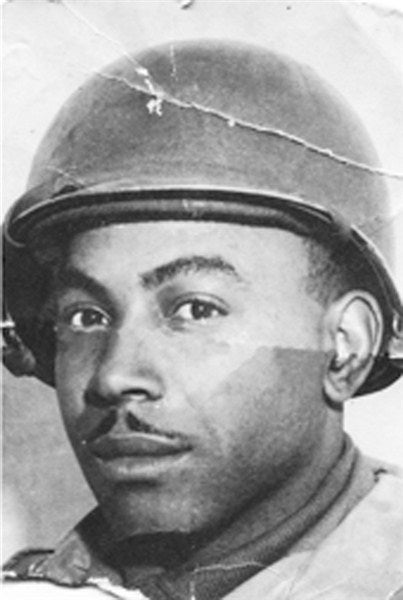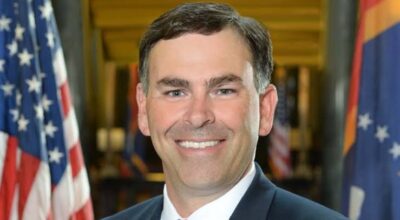Tucker brothers tribute 2/1/13
Published 12:00 am Friday, February 1, 2013

Sgt. Earl Tucker during World War II
(Editor’s note: Earl Tucker died at age 99 Wednesday night in the Memphis VA Hospital. His story is interwoven with the historic milestones of the state and nation and was originally published in a tribute to veterans in 2006. It is reproduced here and on page six in its entirety. Frank Tucker preceded his brother in death in 2008 at age 98.)
By John Howell Sr.
Two brothers who live in southwest Panola County embody both in themselves and through knowledge of their ancestors a rich tapestry of American history in four generations.
Frank Tucker, 96, and his younger brother, Earl, age 92, live on adjoining hillsides where they relocated with their family in 1938 to escape flooding in the Delta.
Their great-grandparents had been brought as slaves directly from Africa and through New Orleans to Port Gibson in Claiborne County. Their grandfather, who died in 1917 and who Frank remembers, recalled seeing his parents sold as slaves.
“They were from the Guinea tribe of Africa,” Earl Tucker said.
Grandfather served in Civil War
When the Emancipation Proclamation freed slaves, their grandfather, Jeffrey Tucker, joined the Ninth Louisiana Infantry (African Descent) which later became the 63rd Regiment of the U. S. Colored Infantry. His brother, Robert Tucker, joined the First Mississippi Calvary (African Descent) which later became the Third Regiment U. S. Colored Calvary.
Among family keepsakes in Earl Tucker’s home is a certificate documenting the service of their grandfather and great uncle.
Through their grandfather they trace their roots back to Africa, and through their grandmother, Kittie Taylor, they trace their ancestors back to Ireland or Wales. She was one of three daughters of the plantation overseer, James Taylor,
Forced to hills by early 20th Century floods
After the Civil War the family relocated several times in the Delta, at one time or another living in Issaquena, Yazoo and Bolivar counties. “There weren’t dams up here then,” said Earl Tucker, referring to the reservoirs built on four north Mississippi rivers to control flooding in the lower Mississippi delta.
After enduring the fickle flooding cycles in the delta, including the Great Flood of 1927, the family had found its way to Coahoma County when large scale flooding occurred again in 1937, finally sending the family to the hilly land overlooking the Delta in Panola’s Chapeltown community.
They moved to their newly-purchased farm on the first day of 1938 and might have spent the remainder of their lives there but for world events that reverberated through the farms and hinterlands of this country to sweep people along as though before a great wave of those Mississippi River flood waters.
Drafted into Army in World War II
“Our calling card came the same day,” Earl Tucker said of the notice from Selective Service that they were to prepare for induction into the army. Their dad, Alfred Tucker, came to Batesville to see a bank president who also served on the local Selective Service board.
“He tried to get both of us deferred,” the younger brother recalled of their father’s effort. The man on the board told him he could only defer one of his sons. Frank Tucker had married Eunice Bivens in 1941, so he got the deferment.
“I was 26 years old and I cried all the way to Vaiden,” Earl Tucker said, laughing as he recalled the bus ride to Camp Shelby near Hattiesburg.
“I had been to Memphis before, but (otherwise) I had never been out of the state.”
Frank Tucker’s deferment was short-lived.
“The president of the bank died in 1942; they got Frank,” the younger brother’s narrative continued.
Trained at Camp Shelby
Frank Tucker was also sent to Camp Shelby for initial training, then to Alexandria, Louisiana and then to New York where he found a waiting troop ship and also found the tears that his younger brother described.
“My eyeballs were floating when I got on that ship,” Frank Tucker said. “Five days and five nights later I was in Scotland.”
Meanwhile, Earl Tucker had been sent to North Carolina for Coast Artillery training and then to Canada where the artillery guarded the waterways leading to the Great Lakes. There he saw the war material of the Lend-Lease Act loaded onto ocean-bound ships and heading for Russia.
The younger brother was sent to Ft. Benning, Georgia for a stint of anti-aircraft training and then back close to home at Camp McCain.
“That’s when the Red Ball Express started training drivers in Louisiana,” Earl Tucker said, remembering the start of the truck transport system American war planners developed to support the thrust across northern Europe into Germany.
On “D plus 12” — 12 days after Allied troops first landed on the shores of Normandy, Earl Tucker landed as the Red Ball Express started rolling inland.
The rapid advance of Allied troops through France, Luxemborg and into Germany kept pressure on the Express to keep up with supplies.
“I was in the Battle of the Bulge,” the younger Tucker said.
“If it hadn’t been for freezing everything, Hitler would have gone back to Normandy,” he added, describing the extremely cold conditions in December, 1944, when German armies launched their last counteroffensive in a desperate attempt to break the back of the Allied advance.
Meanwhile, older brother Frank had also crossed the English Channel into France. “That’s the only time I got sick,” he said, recalling the rough waters of the narrow crossing.
Both were caught up in the Allied advance through Europe, Frank as a messenger; Earl driving a truck in the Red Ball Express. Once when the older brother was serving as a messenger in Belgium “we saw each other’s unit numbers,” Earl Tucker said.
The older brother said that while he was stationed in Paris, the Eiffel Tower became a regular landmark as he navigated his jeep through the city’s narrow streets.
Earl said he never saw the Eiffel Tower. Every time I’d go through there it was night,” he said. Though they had been close to each other in Europe, they would not be reunited until they had returned to their Chapeltown hills after the war.
“There were a whole lot of things I got to see,” during Army service, Earl Tucker continued. “I went to 11 countries, but I never disowned Mississippi.”
Upon his return in 1945, Earl Tucker married the former Eva Boyd.
“I went into debt farming,” the younger brother said. Their marriage, however, was more prosperous and to the union were born Sylvester, Gloria, Earl Jr., Melvin, Alice, Dorothy, Alice, Benny and Keith, who is now deceased.
“There were so many of us, you could hardly count, so I had to make a hustle,” Earl Tucker said. Hustle included off-farm jobs like working to help build Enid Dam, factory jobs and truck-driving jobs.
Frank and Hattie Tucker were parents of one daughter, Ammie Tucker Thomas. His subsequent marriage to the former Eunice Jones following the death of his first wife in 1965 added four stepchildren to his family: Lewis Jones, Lee Walker, Joyce Walker and Herbert Willingham.
In addition to the responsibility of providing for growing families, there was a quiet determination to realize in Panola County the ideals they had fought for in Europe, including the right to vote and the right to see their children educated in the best facilities available.
Earl Tucker joined a fledgling Panola County Voter’s League. He recalls taking the voter’s test then required of voter applicants. It required them to interpret a section of the state’s constitution. He returned to the circuit clerk’s office every 30 days to find about whether he had passed. After three trips he was finally told he “didn’t quite make it.”
The younger brother was among plaintiffs who in the early 1960s successfully sued the circuit clerk seeking registration as voters. That court order, coupled with the “Freedom Summer” of 1964, during which hundreds of college students from out-of-state universities joined in the registration and coupled with the Voting Rights Act of 1965, finally enabled the Tuckers, along with hundreds of other of Panola’s African American citizens, to become voters.
Earl’s daughter, Alice, enrolled as a third grader in formerly all-white schools in Batesville during the first year of a “freedom of choice” plan in 1966. She was soon joined by her siblings, all of whom were nourished on their parents’ ideas of achievement in spite of circumstances.
When Earl and Frank Tucker get together in the same room the conversation becomes laced with their wry wit, honed over the last nine decades together.
Both men are retired from raising cattle, Earl so recently that “I’m still looking for them,” he said.
Both remember the construction of Highway 6 west of Batesville and are interested in the route of the proposed bypass through Batesville, though Frank allows that by the time of its completion, “The groundhogs will be delivering our mail.”
They laugh at each other’s jokes and memories. Each evening Earl drives to his brother’s house to spend the night.
“We’re still together,” he said.
The family has become an institution in itself, holding annual reunions in the distant cities to which its descendants have migrated and offering scholarships to eligible students in the family.





